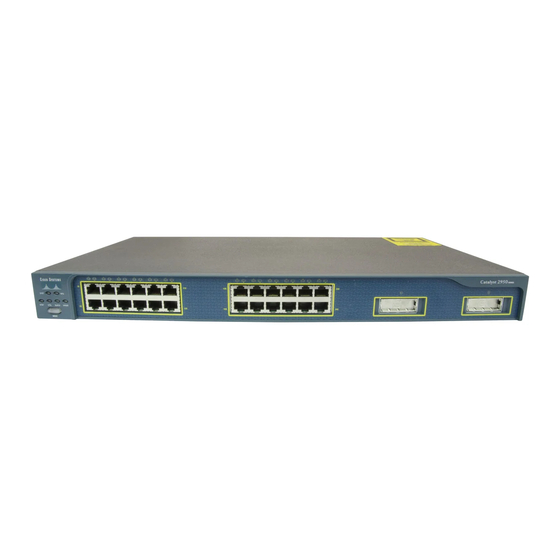Cisco 2950G 24 - Catalyst Switch Fiche technique - Page 5
Parcourez en ligne ou téléchargez le pdf Fiche technique pour {nom_de_la_catégorie} Cisco 2950G 24 - Catalyst Switch. Cisco 2950G 24 - Catalyst Switch 19 pages. Catalyst 2950 series switches with enhanced image software
Également pour Cisco 2950G 24 - Catalyst Switch : Bulletin d'information sur les produits (3 pages), Bulletin d'information sur les produits (5 pages), Manuel de migration (25 pages)

through Cisco Network Assistant Software, Cisco Catalyst 2950 Series switches deliver outstanding performance and ease of use in administering
and managing multicast applications on the LAN.
The IGMPv3 snooping feature allows the switch to "listen in on" the IGMP conversation between hosts and routers. When a switch hears an "IGMP
join" request from a host for a given multicast group, the switch adds the host's port number to the Group Destination Address (GDA) list for that
group. And, when the switch hears an "IGMP leave" request, it removes the host's port from the Content Addressable Memory (CAM) table entry.
PVST+ allows users to implement redundant uplinks while also distributing traffic loads across multiple links. This is not possible with standard
Spanning-Tree Protocol implementations. Cisco UplinkFast technology helps to ensure immediate transfer to the secondary uplink; much better
than the traditional 30-to-60 second convergence time. This is yet another enhancement of the Spanning Tree Protocol implementation. An
additional feature that enhances performance is Voice VLAN. This feature allows network administrators to assign voice traffic to a VLAN
dedicated to IP telephony—simplifying phone installations and providing easier network traffic administration and troubleshooting.
Multicast VLAN Registration (MVR) is designed for applications using wide-scale deployment of multicast traffic across an Ethernet ring-based
service provider network (for example, the broadcast of multiple television channels over a service-provider network). MVR allows a subscriber
on a port to subscribe and unsubscribe to a multicast stream on the network-wide multicast VLAN.
Network Management
Customers can configure one switch at a time with the embedded Cisco Device Manager, or configure and troubleshoot multiple switches with
Cisco Network Assistant, a standalone network management software application optimized for LANs of small and medium-sized businesses with
up to 250 users. Cisco Device Manager offers a simple and intuitive GUI interface for configuring and monitoring the switch. The software is Web-
based and embedded in Cisco Catalyst 3750, 3650, 3550, 2970, 2950, and 2940 Switches. Cisco Express Setup simplifies the switch initialization.
Users now have the option to set up the switch through a Web browser, eliminating the need for more complex terminal emulation programs and
knowledge of the CLI. Cisco Device Manager and Cisco Express Setup reduce the cost of deployment by enabling less-skilled personnel to quickly
and simply set up switches.
Cisco Network Assistant Software provides an integrated management interface for delivering intelligent services, such as multilayer switching,
QoS, multicast, and security ACLs. Cisco Network Assistant Software allows administrators to take advantage of benefits formerly reserved for
only the most advanced networks without having to learn the CLI, or even the details of the technology. With Cisco Network Assistant, customers
can configure multiple ports and switches simultaneously, perform software updates across multiple switches at once, and copy configurations to
other switches for rapid network deployments. Bandwidth graphs and link reports provide useful diagnostic information, and the topology map gives
network administrators a quick view of the network status. Cisco Network Assistant supports a wide range of Cisco Catalyst intelligent switches
from Cisco Catalyst 2950 through Cisco Catalyst 4506. Through a user-friendly GUI, users can configure and manage a wide array of switch
functions and start the device manager of Cisco routers and Cisco wireless access points.
The Cisco Network Assistant Software Guide Mode leads the user step-by-step through the configuration of advanced features and provides
enhanced online help for context-sensitive assistance. Cisco AVVID (Architecture for Voice, Video and Integrated Data) Wizards provide
automated configuration of the switch to optimally support video streaming or video conferencing, voice over IP (VoIP), and mission-critical
applications. In addition, Smartports offers a set of verified feature macros per connection type in an easy-to-apply manner. With these macros,
users can consistently and reliably configure essential security, availability, quality of service, and manageability features recommended for Cisco
Business Ready Campus solutions with minimal effort and expertise. These Wizards and Smartports can save hours of time for network
administrators, eliminate human errors, and ensure that the configuration of the switch is optimized for these applications.
In addition to Cisco Network Assistant Software, Cisco Catalyst 2950 Series switches provide extensive management tools using Simple Network
Management Protocol (SNMP) network management platforms such as CiscoWorks. Managed with CiscoWorks, Cisco Catalyst switches can be
configured and managed to deliver end-to-end device, VLAN, traffic, and policy management. Coupled with CiscoWorks, Cisco Resource Manager
© 2004 Cisco Systems, Inc. All rights reserved.
Important notices, privacy statements, and trademarks of Cisco Systems, Inc. can be found on cisco.com.
Page 5 of 18
